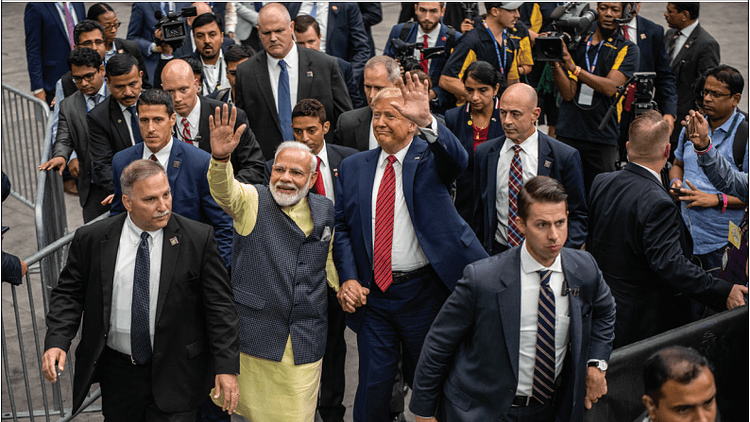India’s national flag being waved outside the US Capitol in Washington D.C. drew immediate attention. This seemed to be the only flag of a foreign country carried by the mob of Trump supporters who stormed the Capitol Bulding, meeting place of the US Congress (Federal Legislature comprising the House of representatives and the Senate), on January 6.
While some condemned the misuse of the national flag in the course of rioting in a foreign country, there was not much surprise. The Overseas Friends of the BJP had openly supported Donald Trump’s bid to be re-elected and the Indian Prime Minister had famously endorsed the bid by calling for ‘Ab Ki Baar Trump Sarkar” at the Howdy Modi rally at Houston in 2019.
The Indian Prime Minister, who likes to believe that all world leaders are his friend, had brushed aside objections to invite the US President in an election year and host the ‘Namaste Trump’ event in 2020 at Ahmedabad. Foreign Policy wonks had raised eyebrows and questioned the utility of the overture to a leader who could be voted out a few months later. But the Indian PM went ahead with the event nevertheless.
On January 7, however, Prime Minister Modi was seen to be making amends by tweeting, "Distressed to see news about rioting & violence in Washington DC. An orderly and peaceful transfer of power must continue. The democratic process cannot be allowed to be subverted through unlawful protests." He seemed to have finally dumped his friend Trump.
But while the Indian PM was not the only world leader to express concern at the violence and rioting in Washington, D.C., critics were quick to ask if like the Indian who waved the tricolour, the Indian PM too was not interfering in the internal affairs of the US. The jibe was triggered by the Ministry of External Affairs routinely asking foreign countries to refrain from commenting on India’s internal affairs.
Tweeted Michael Kugelman, Deputy Director of the Wilson Centre, a think tank in Washington, “Narendra Modi has weighed in on today's attempted insurrection in the US. I think this means he has locus standi to comment on America's internal matters. The Diplomatic Editor of The Hindu Suhasini Haidar was also quick to point out, “In one month, our govt has issued statements on events in US (capitol riots), Sri Lanka (devolution), Pakistan (Temple attack) etc..., and also told half a dozen countries they have no right to comment on Indian "internal matters" (farmers protests, CAA,J&K etc).”
How the outgoing US President is going to react to the Indian PM’s ‘betrayal’ is hard to predict. But Trump did publicly say on several occasions that PM Modi was a good man, a great man, a tough man and how he enjoyed a special relationship with the Indian Prime Minister. Modi, he said, was "a man I am proud to call my true friend." Modi reciprocated by saying about the US President, “What he has done for realizing the American dream is well known."
Not surprisingly, the outgoing US President last month presented the ‘prestigious Legion of Merit’, one of the highest military honours bestowed by US Presidents, to the Indian Prime Minister for his “leadership in elevating strategic partnership of the two countries and emergence of India as a global power”.
The Indian Ambassador to the US Taranjit Singh Sandhu accepted the award on behalf of the Indian PM less than a month ago. The US arguably benefitted a lot more from the strategic partnership as India’s import of military hardware from the US ballooned. The US also took advantage of the special relationship the Indian PM shared with Donald Trump to bargain for lower import duty on US products and more favourable trade deals. Many experts suspect that the controversial farm laws against which Indian farmers are agitating at the moment, are prompted by US lobbies seeking to enter the Indian market.
But even as the US President played on the vanity of the Indian PM, he drove a hard bargain and in 2018 India was dropped by the US from the Generalised System of Preferences (GSP) for the first time since the 1970s. The system allowed developing countries to sell to the United States without tariffs on a number of different products—everything from buffalo hide to AC motors.
Even more damaging was the US President imposing restrictions on H-1B, F-1 and J-1 visas which allowed Indian IT professionals, students and exchange visitors to enter the US. Between 2007 and 2017, a disproportionate number of recipients were from India. More Indians received the H-1B visa than nationals of the next five countries combined. Therefore, the restrictions, imposed ostensibly due to the pandemic and till 2021, hit the Indians harder.
In the fourth volume of his autobiography released posthumously this week, former President Pranab Mukherjee frowns upon the ‘personal friendship’ that the Indian PM so eagerly pursues with world leaders. Friendship, the former President writes, is forged between countries and not between leaders. Such friendships, he adds, are mostly impersonal and even cold, and geared to promote national interest.
As the US President goes down in history as the only elected leader to incite a mob to disrupt the Legislature, the Indian PM could be ruing not heeding the advice of the late President Mukherjee.
































